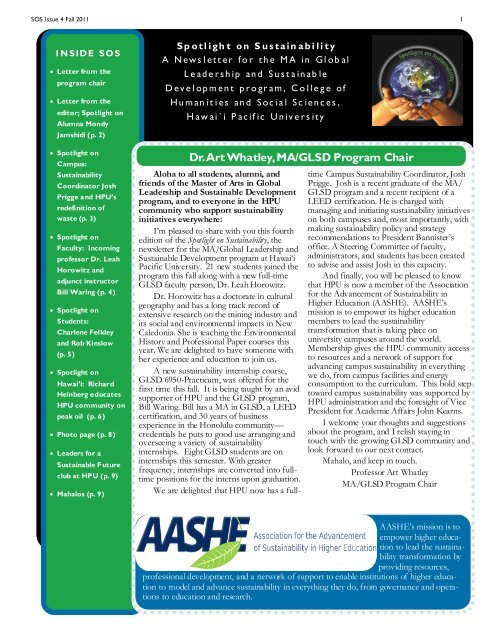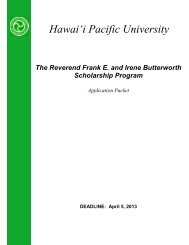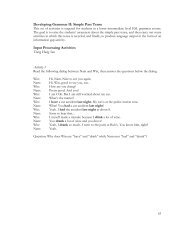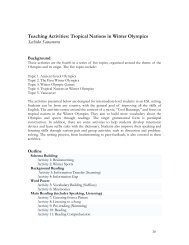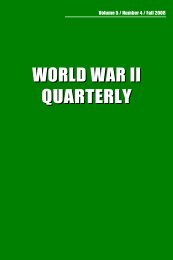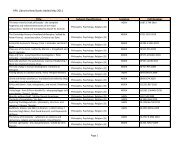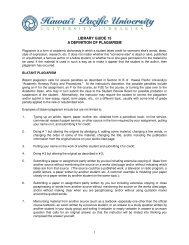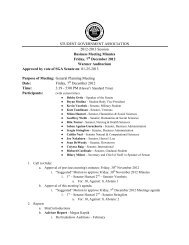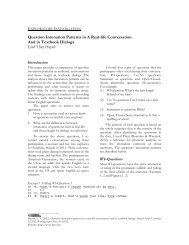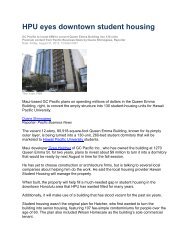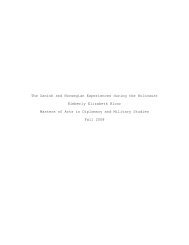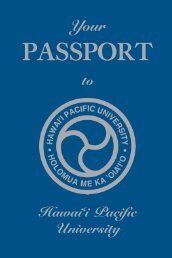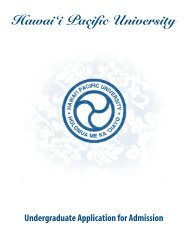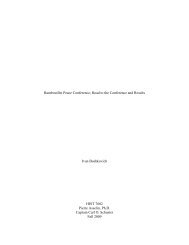Dr. Art Whatley, MA/GLSD Program Chair - Hawaii Pacific University
Dr. Art Whatley, MA/GLSD Program Chair - Hawaii Pacific University
Dr. Art Whatley, MA/GLSD Program Chair - Hawaii Pacific University
Create successful ePaper yourself
Turn your PDF publications into a flip-book with our unique Google optimized e-Paper software.
SOS Issue 4 Fall 2011 1<br />
I N SIDE SOS<br />
Letter from the<br />
program chair<br />
Letter from the<br />
editor; Spotlight on<br />
Alumna Mondy<br />
Jamshidi (p. 2)<br />
Spotlight on<br />
Campus:<br />
Sustainability<br />
Coordinator Josh<br />
Prigge and HPU’s<br />
redefinition of<br />
waste (p. 3)<br />
Spotlight on<br />
Faculty: Incoming<br />
professor <strong>Dr</strong>. Leah<br />
Horowitz and<br />
adjunct instructor<br />
Bill Waring (p. 4)<br />
Spotlight on<br />
Students:<br />
Charlene Felkley<br />
and Rob Kinslow<br />
(p. 5)<br />
Spotlight on<br />
Hawai’i: Richard<br />
Heinberg educates<br />
HPU community on<br />
peak oil (p. 6)<br />
Photo page (p. 8)<br />
Leaders for a<br />
Sustainable Future<br />
club at HPU (p. 9)<br />
Mahalos (p. 9)<br />
S p o t l i gh t o n S u s t a i n a b i l i t y<br />
A N ew s l et t er f o r t h e M A in Gl ob al<br />
L e ad e r s h ip an d S u s t a in ab le<br />
D ev e l op m en t p r o gr am , C o l le g e of<br />
H u m an it i es an d S oc ia l S c ien c es ,<br />
H aw ai ` i P ac if ic U n iv e r s it y<br />
<strong>Dr</strong>. <strong>Art</strong> <strong>Whatley</strong>, <strong>MA</strong>/<strong>GLSD</strong> <strong>Program</strong> <strong>Chair</strong><br />
Aloha to all students, alumni, and<br />
friends of the Master of <strong>Art</strong>s in Global<br />
Leadership and Sustainable Development<br />
program, and to everyone in the HPU<br />
community who support sustainability<br />
initiatives everywhere:<br />
I’m pleased to share with you this fourth<br />
edition of the Spotlight on Sustainability, the<br />
newsletter for the <strong>MA</strong>/Global Leadership and<br />
Sustainable Development program at Hawai‘i<br />
<strong>Pacific</strong> <strong>University</strong>. 21 new students joined the<br />
program this fall along with a new full-time<br />
<strong>GLSD</strong> faculty person, <strong>Dr</strong>. Leah Horowitz.<br />
<strong>Dr</strong>. Horowitz has a doctorate in cultural<br />
geography and has a long track record of<br />
extensive research on the mining industry and<br />
its social and environmental impacts in New<br />
Caledonia. She is teaching the Environmental<br />
History and Professional Paper courses this<br />
year. We are delighted to have someone with<br />
her experience and education to join us.<br />
A new sustainability internship course,<br />
<strong>GLSD</strong> 6950-Practicum, was offered for the<br />
first time this fall. It is being taught by an avid<br />
supporter of HPU and the <strong>GLSD</strong> program,<br />
Bill Waring. Bill has a <strong>MA</strong> in <strong>GLSD</strong>, a LEED<br />
certification, and 30 years of business<br />
experience in the Honolulu community—<br />
credentials he puts to good use arranging and<br />
overseeing a variety of sustainability<br />
internships. Eight <strong>GLSD</strong> students are on<br />
internships this semester. With greater<br />
frequency, internships are converted into fulltime<br />
positions for the interns upon graduation.<br />
We are delighted that HPU now has a full-<br />
time Campus Sustainability Coordinator, Josh<br />
Prigge. Josh is a recent graduate of the <strong>MA</strong>/<br />
<strong>GLSD</strong> program and a recent recipient of a<br />
LEED certification. He is charged with<br />
managing and initiating sustainability initiatives<br />
on both campuses and, most importantly, with<br />
making sustainability policy and strategy<br />
recommendations to President Bannister’s<br />
office. A Steering Committee of faculty,<br />
administrators, and students has been created<br />
to advise and assist Josh in this capacity.<br />
And finally, you will be pleased to know<br />
that HPU is now a member of the Association<br />
for the Advancement of Sustainability in<br />
Higher Education (AASHE). AASHE’s<br />
mission is to empower its higher education<br />
members to lead the sustainability<br />
transformation that is taking place on<br />
university campuses around the world.<br />
Membership gives the HPU community access<br />
to resources and a network of support for<br />
advancing campus sustainability in everything<br />
we do, from campus facilities and energy<br />
consumption to the curriculum. This bold step<br />
toward campus sustainability was supported by<br />
HPU administration and the foresight of Vice<br />
President for Academic Affairs John Kearns.<br />
I welcome your thoughts and suggestions<br />
about the program, and I relish staying in<br />
touch with the growing <strong>GLSD</strong> community and<br />
look forward to our next contact.<br />
Mahalo, and keep in touch.<br />
Professor <strong>Art</strong> <strong>Whatley</strong><br />
<strong>MA</strong>/<strong>GLSD</strong> <strong>Program</strong> <strong>Chair</strong><br />
AASHE’s mission is to<br />
empower higher education<br />
to lead the sustainability<br />
transformation by<br />
providing resources,<br />
professional development, and a network of support to enable institutions of higher education<br />
to model and advance sustainability in everything they do, from governance and operations<br />
to education and research.
SOS Issue 4 Fall 2011 2<br />
Letter from the editor, Sara Cobble<br />
Mondenna ‘Mondy’ Jamshidi began her<br />
study in the Masters of <strong>Art</strong>s in Global<br />
Leadership and Sustainable Development<br />
at HPU in 2009. She provided leadership<br />
and capacity building during her time as<br />
Treasurer of the GREEN Club at HPU<br />
(now called Leaders for a Sustainable Future)<br />
and PeaceJam Hawai‘i, a global responsibility-centered<br />
service learning program.<br />
She now champions green jobs at<br />
Kupu <strong>Hawaii</strong>, a non-profit that provides<br />
paid internships in environmental conservation<br />
and sustainability in her role as the<br />
Urban Corps VISTA.<br />
During her studies, Mondy became the<br />
first HPU RISE intern. She sought out the<br />
experience after becoming inspired in 2008<br />
at the Green for All: <strong>Dr</strong>eam Reborn Conference<br />
held in Memphis, Tenn. in honor<br />
of <strong>Dr</strong>. Martin Luther King. The conference<br />
was held to promote what would become<br />
known as “green collar jobs”; a concept of<br />
“an inclusive green economy strong enough<br />
to lift people out of poverty”<br />
(www.greenforall.org). From then on,<br />
she wanted to get her hands on the skills it<br />
took for sustainability.<br />
In an effort that predates the 2011 Universities<br />
for Sustainability conference at<br />
HPU, she had sought partnership <strong>University</strong><br />
of <strong>Hawaii</strong>, Manoa and attended their<br />
Aloha <strong>GLSD</strong> ‘ohana,<br />
Even after a year in the <strong>GLSD</strong> program, I am still in awe of everything this experience has<br />
given me: the opportunity to live in a cosmopolitan city nestled in some of the most beautiful<br />
wilderness on Earth, learn and fight for issues I deeply care about, and complete a lifechanging<br />
journey alongside a driven and diverse group of students, faculty, and community<br />
members and leaders from all over the country and world. I am continuously inspired by the<br />
events that are taking shape on HPU’s campus and in the state of Hawai‘i, and the <strong>GLSD</strong><br />
program is giving students the chance to participate in both. The networking and work opportunities<br />
in the state for students in this program continue to blossom, and I am heartened<br />
by the increase in green jobs and internships our graduates are seizing. There are so many<br />
stories taking shape on this island and by this program’s alumni who are going on to make a<br />
difference in the world. In this issue, you will read about a few of them: recent alumni Mondy<br />
Jamshidi and Bill Waring, who are using their knowledge and experience they gained in the<br />
program to educate others, as well as current students Charlene Felkley and Rob Kinslow<br />
who are active in educating people in the <strong>Pacific</strong> region about the effects of climate change. I<br />
encourage you to share your stories and your accomplishments with SOS and the <strong>GLSD</strong><br />
community. Thank you for hard work and for doing your part to push this program and<br />
movement forward, and I hope to hear from you soon. Mahalo!<br />
Spotlight on Alumni<br />
green club called Sustainable UH.<br />
“There is no ‘one-brand’ of sustainability,”<br />
Mondy says. “I just wanted to learn<br />
everything there is, specifically how to<br />
make green jobs accessible to all people”.<br />
Mondy was also committed to policy<br />
implementation in her internship with<br />
the Department of Business, Economic<br />
Development and Tourism (DBEDT),<br />
where she worked in the Energy Efficiency<br />
Branch with fellow <strong>MA</strong>/<strong>GLSD</strong><br />
grad Jon Chin and eventually Christopher<br />
Chang-Lo, Brian Wilson and Chris<br />
Barzman. Her favorite part was helping<br />
to do building auditing. She then applied<br />
to become part what would be known as<br />
the RISE UH team.<br />
As a RISE UH intern passionate about<br />
sustainability education, Mondy enjoyed<br />
performing the sustainability audits of<br />
Kalani High School but was the most pas-<br />
Mondy Jamshidi<br />
sionate about teaching others how to do audits, a skill which she employs in her<br />
current position. “There is a true difference between ‘sustainability’ and ‘green,’<br />
and I now have the challenge of teaching this with under-resourced youth who<br />
we’re trying to equip to be ready for <strong>Hawaii</strong>’s green jobs,” she says.<br />
Mondy aims to carry out her experience in the <strong>MA</strong>/<strong>GLSD</strong> program in<br />
building Kupu’s HYCC-Urban Corps program, and she is grateful to <strong>Dr</strong>. <strong>Art</strong><br />
<strong>Whatley</strong>, the faculty and mentorship community she found in program. “Hands<br />
-on applied knowledge from experiential learning is the key to a sustainable future,<br />
at least for my kids,” she said.
SOS Issue 4 Fall 2011 3<br />
In the past several months, many<br />
changes have taken place on the<br />
downtown and Hawai’i Loa campuses.<br />
Department relocations, new<br />
classrooms, new offices, and residence<br />
hall renovations have given HPU a bit<br />
of a facelift. New<br />
technology and<br />
furniture in<br />
classrooms and<br />
student lounges will<br />
enhance the learning<br />
experience of HPU<br />
students. New office<br />
furniture for faculty<br />
and staff has been<br />
added, as well as new<br />
furniture in the<br />
residence halls for the<br />
many HPU students<br />
who call the Hawai’i Loa<br />
Campus “home.” With all of this new<br />
furniture, equipment, and technology<br />
comes the question: What to do with<br />
the discarded items once HPU no<br />
longer needs them<br />
Previously, these items may have<br />
been collected by a disposal company<br />
at a high cost and taken to a local<br />
landfill to be buried. However, now at<br />
HPU we are re-shaping the way we<br />
think about waste. “Reduce-reuserecycle”<br />
is a cornerstone of<br />
sustainability, and this idea was kept in<br />
mind during the entire HPU<br />
renovation project over the past several<br />
months. We reached out to numerous<br />
non-profits, schools, churches,<br />
hospitals and clinics to offer all of our<br />
discarded furniture items to those who<br />
could put them to good use and keep<br />
them out of the landfills. Thinking<br />
wisely about the way we use our<br />
resources, and what we do with them<br />
when we are finished, has become of<br />
important at HPU and around the<br />
world, as global issues such as<br />
overpopulation, natural resource<br />
depletion, environmental degradation,<br />
Spotlight on Campus<br />
Re-shaping the way we think about waste<br />
by Josh Prigge,<br />
HPU Sustainability Coordinator<br />
and global climate change have become<br />
of more concern to us all.<br />
Local green building firm<br />
Sustainable Strategies, LLC functioned<br />
as the project manager for the<br />
renovation of eight hightechnology<br />
classrooms,<br />
the new student gathering<br />
area Sharky's Cove and<br />
the new Business and<br />
Counseling offices. Bill<br />
Waring, president/owner<br />
of Sustainable Strategies<br />
and part-time HPU<br />
faculty, mentioned that<br />
his goal was to “raise the<br />
sustainability bar for<br />
HPU with our green<br />
building strategies.” Bill<br />
explained that “when <strong>Dr</strong>.<br />
Kearns added Sustainable Strategies to<br />
the project team, we accepted the<br />
challenge of running every decision<br />
through the sustainability lens before<br />
finalizing any plans.”<br />
Another big help in keeping<br />
sustainability integrated throughout<br />
these renovations was HPU’s Facilities<br />
Coordinator Rap Craig. Rap worked<br />
alongside the Sustainability Coordinator<br />
to assure these projects contributed as<br />
little waste as possible. Rap also worked<br />
with Bill Waring in the renovation<br />
process, and was “integral to the success<br />
and the change of mindset,” Bill said.<br />
In addition bringing HPU’s<br />
Sustainability Coordinator on board to<br />
coordinate the reuse of all discarded<br />
furniture items, Bill also implemented a<br />
number of other sustainable strategies in<br />
these renovations, including meeting or<br />
exceeding the U.S. Green Building<br />
Council Leadership in Energy and<br />
Environmental Design Waste (LEED)<br />
standards for volatile organic<br />
compounds in all paints and most<br />
adhesives, using Energy Star-rated<br />
electronics wherever possible, assessing<br />
recycled content of all (continued on pg. 7)<br />
Items from downtown<br />
and Hawai‘i Loa cam-<br />
puses that have been<br />
salvaged and reused<br />
since June 2011:<br />
205 mattresses<br />
200 hall desk chairs<br />
175 wood bed frames<br />
87 classroom desks<br />
45 office chairs<br />
30 metal bed frames<br />
30 box springs<br />
29 file cabinets<br />
22 computer tables<br />
17 office desks<br />
15 nightstands<br />
10 dressers<br />
10 office partitions<br />
hospital beds
SOS Issue 4 Fall 2011 4<br />
<strong>Dr</strong>. Leah Horowitz<br />
by Laura Pirkle<br />
The HPU community would<br />
like to extend a warm e komo mai<br />
to the newest member of the<br />
<strong>GLSD</strong> faculty, <strong>Dr</strong>. Leah<br />
Horowitz. <strong>Dr</strong>. Horowitz relocated to Hawai‘i this past summer with her family and is currently<br />
teaching three courses in the <strong>GLSD</strong> program: Research Methods, Environmental History of the<br />
Modern World and the 7100 Capstone course. <strong>Dr</strong>. Horowitz obtained her undergraduate degree from<br />
Amherst College in 1994, earning an interdisciplinary degree in Conservation and Development in the<br />
Third World. She earned her M.A. Phil in Environment and Development (Geography) from the<br />
<strong>University</strong> of Cambridge in 1996, and then completed her Ph.D. in Cultural Geography (Resources, Environment and<br />
Society) in 2003 at Australian National <strong>University</strong>.<br />
<strong>Dr</strong>. Horowitz has an extensive professional background in the sustainability field. Her experience includes working<br />
for the WWF, Conservation International in Washington D.C., and as Melbourne project officer for a mining certification<br />
evaluation program. <strong>Dr</strong>. Horowitz’s geographical area of research has predominantly been in New Caledonia, where she<br />
worked as a mining consultant, and then returned conduct her doctoral field work.<br />
New Caledonia, a part of the geographical region known as Melanesia, is administratively part of France and<br />
approximately 930 miles east of Australia. Nickel mining makes up a large part of the New Caledonian economy and is one<br />
of the most predominant forms of environmental degradation in the region. (continued on page 7)<br />
Bill Waring<br />
by Sara Cobble<br />
As an <strong>MA</strong>/<strong>GLSD</strong> graduate,<br />
LEED associate, and owner of<br />
the consulting and project<br />
management firm Sustainable<br />
Strategies, LLC, Bill Waring<br />
knows a thing or two about<br />
sustainability. He is now sharing<br />
his wealth of experience<br />
and skills as an adjunct professor<br />
teaching the newest addition<br />
to the <strong>MA</strong>/<strong>GLSD</strong> curriculum,<br />
the 6950 Practicum<br />
course. The course provides an<br />
opportunity for students with<br />
jobs and internships in the sustainability<br />
field to help develop their skills and align their<br />
work in the classroom with their professional experiences.<br />
“The goal is to give people some hands-on, skills-based<br />
training that's a part of their degree,” Waring said.<br />
For the first time, the practicum is being offered as an inclass<br />
course, rather than an independent study. Waring’s<br />
professional paper for his master's degree, which he cowrote<br />
with HPU Sustainability Coordinator and <strong>MA</strong>/<strong>GLSD</strong><br />
graduate Josh Prigge, was an attempt to address the<br />
strengths of the <strong>GLSD</strong> program and opportunities it could<br />
benefit from. Their research revealed that students were<br />
seeking "more practical learning experience to go along with<br />
Spotlight on Faculty<br />
the great theoretical stuff we were already doing,<br />
The class is ideal for third-semester students who are beginning<br />
to work on their professional papers, as the practicum<br />
course gives students a chance to align their work with<br />
their theses. There are many ways a student can qualify for<br />
the course: he or she can be working as a volunteer, paid<br />
intern, full-time employee or working on a specific research<br />
project. The course can be taken for anywhere from 1 to 4<br />
credits, depending on the depth of the student's project and<br />
the deliverables he or she wants to produce. In the seminarstyle<br />
class, students discuss current sustainability issues and<br />
events and what is going in their respective work environments.<br />
This collaboration is beneficial to help students work<br />
through issues, as very few problems they encounter are<br />
unique,” Waring said.<br />
As a 30-year veteran of the retail industry who focused<br />
primarily on building, Waring learned that conserving resources<br />
and incorporating sustainable practices are a winwin<br />
situation in the business world because they produce<br />
desirable environmental and economic outcomes. His desire<br />
to teach came about four years ago, and he decided to answer<br />
his calling and move from the corporate world to the<br />
classroom. Upon finishing his <strong>MA</strong>/<strong>GLSD</strong> degree in spring<br />
2011, he began working with (please see Waring, continued<br />
on page 7) architectural firms on green building. He<br />
then created his own firm, Sustainable Strategies, LLC,<br />
which primarily focuses on green building projects and the<br />
project management and building of facilities. His firm was<br />
an asset to the downtown HPU campus renovations, and<br />
thanks to his efforts and a supportive administration, many
SOS Issue 4 Fall 2011 5<br />
The <strong>GLSD</strong> program has a unique<br />
student body with diverse backgrounds<br />
and experiences. It was my pleasure to<br />
sit down with second-year student<br />
Charlene Felkley and discuss her<br />
position as a PEAC outreach and<br />
education officer and her recent 26-day<br />
tour of eight <strong>Pacific</strong> Islands, where she<br />
provided education and outreach about<br />
global warming and weather-related<br />
disasters and conditions.<br />
Charlene earned her B.S. in Natural<br />
Resource Management and Wildlife<br />
Management from Ohio State<br />
<strong>University</strong>. She moved to <strong>Hawaii</strong> in<br />
2008, joined the <strong>GLSD</strong> program and<br />
began working for the National and<br />
Oceanic Atmospheric Administration<br />
(NOAA), one of the seven uniformed<br />
branches of the U.S. military.<br />
NOAA provides weather<br />
forecasting, storm warnings, buoy<br />
service, coastal restoration, fisheries<br />
management and a platform for<br />
scientists to further their research and<br />
work initiatives. Charlene’s work<br />
primarily focuses on educating and<br />
people and communities on the effects<br />
of climate change, such as the ENSO<br />
Rob Kinslow<br />
Rob Kinslow and Nastassja Noell interview Stephen<br />
Asamoah Duah head of the Ghanaian Forestry commis-<br />
sion at the residence of the Ofinso Ashanti region chief<br />
in Kumasi, Ghana. They documented the ELEEP experi-<br />
ence using Flip cameras and audio recording equipment<br />
to help <strong>University</strong> of Duquesne promote the benefits<br />
of cross-cultural exchanges and international sustaina-<br />
bility-focused internships.<br />
by Laura Pirkle<br />
Spotlight on Students<br />
Charlene Felkley<br />
by Laura Pirkle<br />
(El Niño Southern Oscillation) cycle<br />
and other weather-related services and<br />
forecasts for all U.S.-affiliated <strong>Pacific</strong><br />
islands, including Hawai‘i.<br />
NOAA holds monthly conference<br />
calls with these island nations on the<br />
second week of each month. These calls<br />
cover a great deal of material and are<br />
critical for NOAA’s continued guidance<br />
and education to these regions. Topics<br />
of the conference calls include the<br />
rainfall percentage, sea level rise, disaster<br />
forecasting such as typhoons and<br />
currents and drought conditions, and<br />
preparedness updates by the individual<br />
islands. This type of ongoing<br />
correspondence enables Charlene and<br />
NOAA to better prepare, educate and<br />
monitor conditions in each of these<br />
regions and offer appropriate support<br />
and educational materials.<br />
Charlene’s recent tour, which<br />
included stops on Guam, Palou, and the<br />
islands of Micronesia, allowed her to<br />
reach out to island nations and offer<br />
education and support materials on<br />
climate change, the ENSO cycle and<br />
other <strong>Pacific</strong> Island-specific needs and<br />
concerns.<br />
She discussed the constant “pull and<br />
push” of each nation regarding outreach<br />
and support. Most of these nations want<br />
to maintain seclusion, yet need and<br />
appreciate the offered services. These<br />
island nations have distinct local<br />
cultures and are much more vulnerable<br />
to climate change and the effects of<br />
natural disasters; therefore the type of<br />
guidance is carefully chosen to ensure<br />
reciprocity, understanding, and respect<br />
for local cultures and lifestyles.<br />
Many <strong>GLSD</strong> students have seen Rob Kinslow's friendly face around campus,<br />
collaborated with him on local community service projects, or sat in on one of his<br />
collaborative meetings on innovative projects for community development. Rob’s<br />
service to the community started as a child. The eldest of 11, Rob grew up on a<br />
farm where he assumed many responsibilities and learned a great deal about community<br />
in service to the greater good. He then took a degree in aerospace engineering,<br />
eventually working for the military-industrial complex in California. As<br />
ethical concerns about his chosen profession arose, he made a complete lifestyle<br />
change and took a hiatus to travel the world to reevaluate his personal and professional<br />
goals. His view of a sustainable future began to take shape and he felt the<br />
need to pursue a lifestyle that took into consideration the elements of a healthy<br />
community and Earth.<br />
Once he returned to California he began the process of founding a land trust<br />
in Los Angeles. Rob and three other people saw the open space in the middle of<br />
industrial Los Angeles as a unique opportunity to build a large nature park. The<br />
land had previously been granted to Howard Hughes by the U.S. government to<br />
build his missile factory, and the city and county of Los Angeles were quickly moving<br />
forward planning millions of square feet of office spaces, businesses and attractions.<br />
Using a multi-faceted approach involving community groups, businesses,<br />
artists and politicians with a legal, political and moral strategy, they eventually built<br />
a coalition of 110 groups representing two million people and convinced the state<br />
of California to issue a 20 million dollar bond to purchase 640 acres of land. There
SOS Issue 4 Fall 2011 6<br />
Kinslow (continued from pg. 4) are at least 9 endangered species in this wetland. Rob then moved to <strong>Hawaii</strong> in 1999 and<br />
began what became over a decade of volunteering with community groups, consisting of about 1,000 hours a year. He joined<br />
the <strong>GLSD</strong> program in fall of 2010 to become a more effective community educator and began reaching out to students to<br />
help them find their place in community service.<br />
Recently he participated in the <strong>Hawaii</strong> Emerging Leaders <strong>Program</strong> (HELP), a student conference simulating the Asia<br />
<strong>Pacific</strong> Economic Cooperation (APEC) in November 2011. Sponsored by the <strong>Pacific</strong> Forum, the objective of HELP was to<br />
develop a public policy agenda grounded in emerging students’ perspectives regarding how climate change will affect each<br />
country’s economy. To understand the issues relating to their member economy, participants acquired an understanding of<br />
the foreign policies of member countries. The focus was a results-based approach to climate change problems. A successful<br />
outcome was defined as one in which a framework for achieving a well-defined strategy could be agreed upon by all member<br />
economies.<br />
The HELP simulation consisted of 37 students grouped into five countries: China, the United States, Canada, Peru and<br />
Vietnam. Brenda Suazo, the team leader for Peru and five other students, Genevieve Bourgeois, Marcela Gill, Kate Burns,<br />
Alix Reichert, and Therese Oriola, researched, wrote, developed presentation materials and supported the negotiations of the<br />
Peru team. Over the course of four weeks, they collaborated to create policy resolutions in a written and visual form for Peru.<br />
All of the five teams then presented the results of their research to the <strong>Pacific</strong> Forum staff on November 4 at the <strong>Hawaii</strong><br />
State capitol. Team leaders negotiated at the simulation and the individual resolutions were voted. Team Peru developed<br />
three resolutions, with mining as their primary focus. Due to the extremely detrimental effects mining has on a multitude of<br />
natural and societal resources, sustainable solutions are essential. The second area of resolution was a reduction in tariffs on<br />
“green” products such as solar panels, and the third resolution being a zero waste policy by 2025.<br />
“In the <strong>GLSD</strong> program we are constantly reminded of the enormous positive potentials of choosing sustainable solutions,”<br />
Rob said. "We should consider the alternatives to not adopting sustainable solutions to address industrial pollution.<br />
There are no limits to sustainable development- there are clear limits to growth and business as usual.” These experiences<br />
have enabled Rob to gain a new perspective of what sustainable development is in the context of policy and legislative reform.<br />
He thanks all of Team Peru for their leadership, collaborative spirits and the opportunity to work with such creative<br />
people. From the traffic closures to the hustle and bustle in Honolulu, APEC left a lasting impression on most of us. However,<br />
sharing these experiences allows us to be mindful of a different approach to APEC: initiatives that may possibly be a part<br />
of the near future.<br />
On life in a post-carbon future:<br />
Richard Heinberg at HPU<br />
by Sara Cobble<br />
Photo by Amy Schwab<br />
<strong>Dr</strong>. <strong>Art</strong> <strong>Whatley</strong> shakes hands with Richard Heinberg<br />
on the Hawai’i Loa lanai on 9 November 2011.<br />
Spotlight on Hawai`i<br />
One of the world's leading peak oil educators, Richard Heinberg, appeared at<br />
HPU Nov. 9 to present “The New Economy and Sustainability in Higher Education.”<br />
After speaking at the Asia-<strong>Pacific</strong> Economic Cooperation (APEC), Heinberg<br />
visited the Hawai’i Loa campus lanai to discuss peak oil, the new economy,<br />
and the purpose of higher education in a world beyond carbon with HPU students,<br />
staff and the community.<br />
Peak oil refers to the height of global oil production followed by an irreversible,<br />
long-term decline. It does not mean that oil has run out, but that it will be more<br />
expensive and energy-intensive to extract, which could present problems for a<br />
modern society based on the availability of cheap fossil fuels for transportation,<br />
food production and the manufacturing of plastics, fertilizers, pharmaceuticals<br />
and more. Heinberg is recognized for his discourse on the necessity of moving<br />
beyond fossil fuels and the potential for a new sustainable economy that is based<br />
on human happiness and the health of the biosphere rather than on infinite<br />
growth and consumption. He has written and edited numerous essays, articles<br />
and books on these subjects, including "The End of Growth" (2011), "The Post<br />
Carbon Reader" (2010), and "The Party's Over: Oil, War & the Fate of Industrial<br />
Societies" (2003). He has spoken all over the United States and in dozens of<br />
countries and has appeared in the documentary films “The End of Suburbia” and<br />
“The 11th Hour” starring Leonardo DiCaprio." Heinberg received the M. King<br />
Hubbert Award for Excellence in Energy Education and the Youtube
SOS Issue 4 Fall 2011 7<br />
Heinberg (continued from pg. 6) “DoGooder Video of the<br />
Year” Award for his animation "300 Years of Fossil Fuels in 300<br />
Minutes.” Heinberg is also the Senior Fellow-in-Residence at the Post-<br />
Carbon Institute, an organization founded in 2003 and dedicated to leading<br />
“the transition to a more resilient, equitable and sustainable world,”<br />
according to its website.<br />
HPU Sustainability Coordinator Josh Prigge said Heinberg's work is<br />
educational, eye-opening, and “beneficial for anyone interested in sustainability,<br />
climate change and energy issues, and even more beneficial for<br />
those who are not as informed on these topics.”<br />
“I read Richard’s book ‘The Party’s Over’ before I began the <strong>GLSD</strong><br />
program here at HPU, and it remains one of the most interesting and eye-<br />
Photo by Amy Schwab<br />
opening books I have ever read,” Prigge said.<br />
Richard Heinberg speaks with <strong>MA</strong>/<strong>GLSD</strong> student Danielle Lien<br />
“Richard Heinberg's The End of Growth, and his other writing as well,<br />
galvanize our attention to the specter of economic decline. He shakes our deep faith in the notion of ever lasting economic<br />
growth; yet he let us down softly, pointing to green technologies and ways to structure post-growth economies.,” said <strong>Dr</strong>.<br />
<strong>Art</strong> <strong>Whatley</strong>, program chair of the <strong>GLSD</strong> program. Heinberg helps us confront our addictions to growth and to chart a path<br />
to a steady-state world.” A video of the presentation can be viewed on the HPU <strong>GLSD</strong> program webpage.<br />
(continued from page 3) new<br />
furniture, energy efficient<br />
lighting and motion sensors,<br />
and using Interface carpet<br />
in the two new classrooms<br />
in the Frear Center.<br />
Interface carpet tiles are<br />
the sustainable alternative to<br />
traditional carpet, and are<br />
made from 100 percent<br />
recycled material. As Bill<br />
explains, Interface is “the<br />
industry leader in<br />
developing sustainably<br />
produced carpet, and<br />
revolutionized the industry<br />
by establishing the first<br />
cradle-to-cradle, no-waste<br />
manufacturing process.”<br />
Some people assume<br />
that sustainability refers<br />
only to environmental<br />
issues, but being sustainable<br />
means considering<br />
environmental, social, and<br />
economic factors with all of<br />
our actions. Sustainable<br />
development meets the<br />
needs of the current<br />
generation without<br />
compromising future<br />
generations ability to meet<br />
their own needs, while<br />
contributing to the longterm<br />
environmental, social,<br />
and economic health of<br />
society.<br />
Without a doubt, our<br />
actions at HPU over the past<br />
several months have<br />
benefited our environment,<br />
our community and our<br />
economy. We have<br />
contributed to the protection<br />
of our natural environment<br />
by keeping items out of the<br />
landfills, and we have<br />
prevented the need to<br />
extract more natural<br />
resources for the production<br />
of more goods. We have<br />
contributed to the good of<br />
the community by providing<br />
free furniture for many<br />
organizations in need, who<br />
will in turn be more effective<br />
in their service to the<br />
community. We have also<br />
helped many organizations<br />
save money on buying new<br />
furniture, while saving<br />
money ourselves on waste<br />
pick-up and disposal fees.<br />
Horowitz (continued from pg. 4)<br />
<strong>Dr</strong>. Horowitz has focused<br />
on the many effects of<br />
mining in New Caledonia<br />
and is still concentrating on<br />
this region in her current<br />
research. She has always had<br />
a strong affinity for nature,<br />
ecology and the<br />
environment, and<br />
acknowledges the emotional<br />
and intellectual importance in<br />
developing respect and<br />
understanding of the earth<br />
and its resources. Her<br />
professional experiences<br />
have molded that into a<br />
working passion for the field<br />
of sustainability. As a<br />
professor, she aims to<br />
prepare students to become<br />
better citizens of the world<br />
through skill building and<br />
information gaining. She<br />
helps students think more<br />
critically, build better<br />
arguments, and enable them<br />
to make more informed<br />
decisions in life, both<br />
personally and professionally.<br />
Her advice to students is to<br />
consider options carefully,<br />
and not be afraid to try<br />
different career paths in their<br />
lives. Welcome to HPU, <strong>Dr</strong>.<br />
Horowitz! Aloha.<br />
Waring (continued from pg. 4)<br />
green strategies that had never<br />
been used at HPU before<br />
were incorporated into the<br />
process. Waring also played a<br />
central role in the hiring of<br />
RISE (Rewarding Intern-<br />
ships for Sustainable Employment)<br />
interns at the Department<br />
of Business, Economic<br />
Development and Tourism<br />
(DBEDT) to work on energy<br />
and waste issues. He partnered<br />
with Gail Suzuki-Jones and<br />
<strong>MA</strong>/<strong>GLSD</strong> alumni Jon Chin in<br />
DBEDT's Energy Efficiency<br />
branch, and they secured an<br />
EPA grant that enabled them<br />
to hire seven interns, including<br />
a few <strong>MA</strong>/<strong>GLSD</strong> students.<br />
Answering the call to teach<br />
was a happy move for Waring:<br />
he said his new role as a professor<br />
is a “labor of love” that is<br />
immensely rewarding.<br />
“I know the potential of the<br />
students in our program. I<br />
know the passion of the students<br />
in our program,” he said.<br />
“To be able to find ways to give<br />
them skills to get out there and<br />
make some changes in the<br />
world, and hopefully get<br />
hooked up with the right people,<br />
it's really important.<br />
Waring is proud to hear that<br />
students are applying their theoretical<br />
classroom knowledge in<br />
the real world and turning their<br />
unpaid internships into fulltime<br />
jobs. “That's about the<br />
best news I can get,” he said.
SOS Issue 4 Fall 2011 8<br />
Fall 2011 was a busy and productive<br />
semester for <strong>GLSD</strong><br />
students, who were involved in<br />
new campus and community<br />
events and began new traditions<br />
for the program. September 29<br />
marked the inaugural Student<br />
and Faculty Welcome Event, a<br />
meet-and-greet held in the<br />
Warmer Auditorium on the<br />
downtown campus, where returning<br />
students and faculty<br />
welcomed incoming students<br />
and <strong>Dr</strong>. Leah Horowitz to the<br />
<strong>GLSD</strong> ‘ohana. <strong>GLSD</strong> students<br />
dedicated their time to campus<br />
and community service projects.<br />
They participated in beach<br />
clean-ups and rallies for bicyclefriendly<br />
streets in Waikiki,<br />
brought sustainability leaders to<br />
speak on campus, maintained<br />
the campus recycling program,<br />
completed energy audits, took<br />
on green internships and jobs,<br />
and spread awareness about<br />
sustainability issues wherever<br />
possible.<br />
Lee Howery and Linh Do work<br />
the LSF table at Club Carnival on<br />
the downtown campus.<br />
A bicycle is on display at Moving Planet<br />
Waikiki. Students and community members<br />
marched in the Aloha Festival Floral Parade<br />
to demand safer streets for bicycling.<br />
Spotlight in Photos<br />
Members of the Leaders for a Sustainable Future<br />
club show off the trash they collected during a<br />
beach clean-up at Fort DeRussy in October 2011.<br />
Above: <strong>GLSD</strong> faculty <strong>Dr</strong>. <strong>Art</strong> <strong>Whatley</strong> and <strong>Dr</strong>.<br />
Regina Ostergaard-Klem welcome new professor<br />
<strong>Dr</strong>. Leah Horowitz at the <strong>GLSD</strong> Student<br />
and Faculty Welcome Event on Sept. 29, 2011.<br />
<strong>GLSD</strong> students and alumni get their hands dirty<br />
while volunteering for the 4th Annual Martin<br />
Luther King, Jr. Day of Service.<br />
<strong>GLSD</strong> students Brenda Suazo and Genevieve<br />
Bourgeois are all smiles at the <strong>GLSD</strong> Student<br />
and Faculty Welcome Event.<br />
LSF president Linh Do greets attendees<br />
at the first annual Student and<br />
Faculty Welcome Event, held Sept. 29<br />
in the Warmer Auditorium.<br />
<strong>GLSD</strong> second-year students Dingilizwe<br />
Ncube, Jason Allison and Rob Kinslow<br />
catching up at the <strong>GLSD</strong> Student and<br />
Faculty Welcome Event.<br />
Have a photo you’d like to share?<br />
Send it to awhatley@hpu.edu
SOS Issue 4 Fall 2011 9<br />
Hawai'i <strong>Pacific</strong> <strong>University</strong>'s logo<br />
is based on the Asian concept<br />
of yin and yang, the logo signifies<br />
the fluid and polar, yet balanced,<br />
aspects of life. The tri-part<br />
design represents the student, education, and<br />
community. The "wave" form symbolizes<br />
HPU's location at the center of the <strong>Pacific</strong><br />
region. The vortex suggests the synergy<br />
resulting from the successful combination of<br />
the three elements of the orb.<br />
Leaders for a Sustainable Future<br />
In fall 2011, the GREEN (Globally Responsible<br />
Environmental Efforts Now) Club changed its name to<br />
Leaders for a Sustainable Future (LSF). The club’s new name<br />
and direction will build upon the GREEN Club’s strong<br />
foundation and continue to provide more opportunities for<br />
HPU students to become campus and community leaders on<br />
the journey toward a more sustainable future. The club hopes<br />
t o achieve partnerships with HPU and the state of Hawai’i to assist<br />
as innovators, program assistants, leaders and professionals and build a more<br />
sustainable community.<br />
The club had an active semester, with LSF members participating in<br />
campus and community work including internships, energy audits, gardening<br />
days at the Hawai‘i Loa campus, grant writing, beach clean-ups and more.<br />
The club also hosted a welcome dinner for <strong>GLSD</strong> students and staff in<br />
September, and hosted a presentation in November by renowned peak oil<br />
educator Richard Heinberg.<br />
LSF president Linh Do said she hopes to increase student involvement<br />
in the spring semester events, which will include trail restoration, hiking,<br />
Earth Day events and a presentation by a climate change speak from former<br />
Vice President Al Gore’s “The Climate Reality Project. Through these<br />
campus events we hope to spread awareness and get more students and<br />
faculty involved in the sustainability scene.” To learn more about LSF, email<br />
lsf.hpu@my.hpu.edu<br />
HPU’s motto, Holomua Me Ka 'Oia'i'o, written in the<br />
Hawai`ian language, means "Forward with Truth."<br />
<strong>MA</strong> - Global Leadership and Sustainable<br />
Development<br />
Hawai'i <strong>Pacific</strong> <strong>University</strong><br />
College of Humanities and Social Sciences<br />
1188 Fort St.<br />
Honolulu, Hawai'i 96813<br />
www.hpu.edu<br />
Mahalo Nui Loa!<br />
Sara Cobble,<br />
<strong>GLSD</strong>, Co-editor<br />
Rob Kinslow,<br />
<strong>GLSD</strong>, Co-Editor<br />
Laura Pirkle,<br />
<strong>GLSD</strong>, Contributor<br />
Linh Do,<br />
LSF President<br />
Mondy Jamshidi,<br />
<strong>GLSD</strong>, Contributor<br />
Amy Schwab,<br />
Photographer<br />
Ionut Toma,<br />
Photographer<br />
Josh Prigge,<br />
HPU Sustainability<br />
Coordinator<br />
LSF members team up with the HPU Vegetarian<br />
Club for a work day in the garden at the<br />
Hawai‘i Loa campus.<br />
LSF Mission and Vision<br />
Mission: The Hawai‘i <strong>Pacific</strong> <strong>University</strong><br />
Leaders for a Sustainable Future’s mission is<br />
to serve as a facilitating and supportive organization<br />
in HPU and the State of Hawai‘i’s<br />
efforts toward becoming a more sustainable<br />
community. Its members work in close collaboration<br />
with outside partners and internal<br />
sustainability networks to assist as innovators,<br />
program assistants, and as leaders. We<br />
put our efforts toward building a more sustainable<br />
island community through integration<br />
of social, ecological, and economic practices.<br />
Vision: The HPU Leaders for a Sustainable<br />
Future aim to be part of a leading sustainable<br />
institution that is valued, integrated and part<br />
of a quality and healthy State of Hawai‘i.<br />
The Spotlight on Sustainability<br />
team hopes you enjoyed the<br />
fourth edition. As always, we<br />
welcome your feedback and<br />
would love to hear your<br />
suggestions for upcoming<br />
topics. We encourage you to<br />
submit your writings for<br />
p u b l i c a t i o n i n o u r<br />
collaborative newsletter.<br />
Contact awhatley@hpu.edu<br />
Photo by Ionut Lucian Toma


